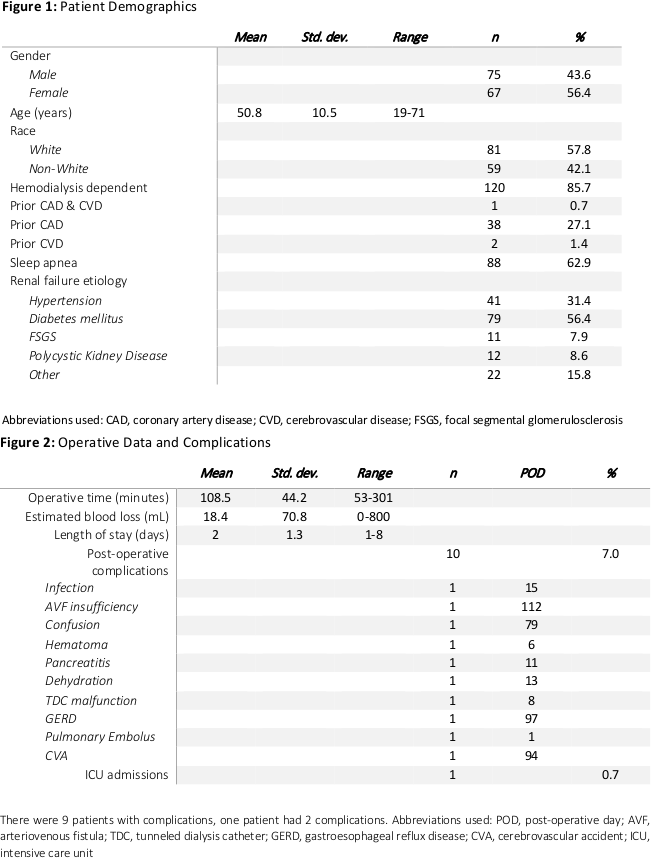Five Year Experience with Laparoscopic Sleeve Gastrectomy in Obese Renal Transplant Candidates.
University of Cincinnati, Cincinnati
Meeting: 2017 American Transplant Congress
Abstract number: 468
Keywords: Kidney transplantation, Obesity, Renal failure, Waiting lists
Session Information
Session Name: Concurrent Session: Surgical Issues (Minimally Invasive/Open): All Organs
Session Type: Concurrent Session
Date: Tuesday, May 2, 2017
Session Time: 2:30pm-4:00pm
 Presentation Time: 2:42pm-2:54pm
Presentation Time: 2:42pm-2:54pm
Location: E451a
INTRODUCTION: Obesity in end stage renal disease (ESRD) patients may not be adequately addressed by medical management, and represents a barrier to renal transplantation. We have previously demonstrated feasibility and short term results with laparoscopic sleeve gastrectomy (LSG) in these patients. We present long term results from a large population of patients who underwent LSG.
METHODS: A prospective metabolic surgery database for patients with ESRD who underwent LSG was established in 2011. Data was analyzed through July 2016.
RESULTS: 142 ESRD patients underwent LSG. Median follow up was 223 days (98-418 days). Mean age was 50.8±10.5 years. Mean body mass index (BMI) prior to LSG was 44.4 kg/m2 (35-87.3 kg/m2), and decreased to 37.6 kg/m2 (22.1-65.7 kg/m2) following LSG (p<0.01). Mean time from LSG to waitlist was 243 days (67-757 days). Mean time from LSG to KT was 569.7 days (140-1245 days). 21 patients received a kidney transplant (KT) following LSG. Mean BMI reduction was 8.0±4.4 kg/m2 in patients who received KT compared to 6.2±4.2 kg/m2 in patients who are not on the waitlist (p=0.01). 30 day mortality was 0.7% (n=1). In total, 8 mortalities occurred (5.6%): 6 prior to listing, and 2 on the waitlist, compared to our center's annual wait list mortality rate of 7%. There were 10 complications following LSG (7.0%), and 1 patient required ICU admission (0.6%). Wound infection rate was 0%. The average hospital length of stay was 2±1.3 days (range 1-8 days). Patients experienced a 44.4% reduction in antihypertensive medications (p<0.01) and prevalence of type 2 diabetes decreased from 57.2% to 36.1% (p<0.01).
CONCLUSION: Laparoscopic sleeve gastrectomy has minimal complications with a mortality rate comparable to that of patients on the kidney waitlist, and therefore is a safe and effective method of weight loss in patients with ESRD. The use of bariatric surgery in morbidly obese ESRD patients may facilitate access to transplantation along with improving obesity related conditions such as diabetes and hypertension.
CITATION INFORMATION: Jung A, Kim Y, Dhar V, Hanseman D, Tadros J, Dehart-Kilgore S, Alloway R, Schauer D, Shah S, Govil A, Woodle E, Diwan T. Five Year Experience with Laparoscopic Sleeve Gastrectomy in Obese Renal Transplant Candidates. Am J Transplant. 2017;17 (suppl 3).
To cite this abstract in AMA style:
Jung A, Kim Y, Dhar V, Hanseman D, Tadros J, Dehart-Kilgore S, Alloway R, Schauer D, Shah S, Govil A, Woodle E, Diwan T. Five Year Experience with Laparoscopic Sleeve Gastrectomy in Obese Renal Transplant Candidates. [abstract]. Am J Transplant. 2017; 17 (suppl 3). https://atcmeetingabstracts.com/abstract/five-year-experience-with-laparoscopic-sleeve-gastrectomy-in-obese-renal-transplant-candidates/. Accessed February 28, 2026.« Back to 2017 American Transplant Congress
